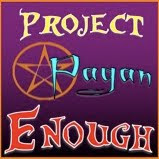Before reading this post, I invite you to read the two I've written so far. While you can absolutely read this one free-standing, the prior two provide some good background:
- Another cost of bigotry, classism, bullying, homophobia, and heterosexism
- Reactions to "The Prep School Negro"
Today's post is a letter, one that was surprisingly scary to write. Some part of me still feels like that scared high school froshling or sophomore who's being blamed for being bullied. (And I was blamed for being bullied.) Some part of me almost expects them to say, "Well, what do you expect? You did
turn out to be a lesbian." To which my grown-up self says, "That attitude is exactly why LGBTQ teens have an even-higher risk of being bullied and of committing suicide than their straight and cisgender peers. That needs to stop."
Why this post, now? http://www.writeyourprincipal.com/, and the encouragement of my Garrison friends on Facebook and of Andre Robert Lee. Thank you.
October 12, 2010
Melinda Bihn
Head of the Upper School
G. Peter O’Neill, Jr.
Head of School
Garrison Forest School
300 Garrison Forest Road
Owings Mills, MD 21117
Dear Ms. Bihn and Mr. O’Neill,
I’m a 1986 alumna of Garrison Forest School. Several things are prompting me to write to you today: the Write Your Principal Project (www.writeyourprincipal.com); conversations I had during this year’s National Coming Out Day; the increased attention currently being paid to the lesbian, gay, bisexual, transgender, and queer teenagers who have recently committed suicide; and the heartbreaking fact that even after those deaths, more LGBTQ teenagers are committing suicide every day.
But what’s prompting me most of all to write are the conversations I am starting to have with other Garrison alumnae about our experiences of bullying when we were at Garrison – and in particular, the pain from anti-lesbian bullying I experienced when I was a Garrison girl. That pain remains with me to this day, poisoning the legacy of what was in so many other ways a wonderful education, and poisoning my present-day relationship with GFS.
When I was at Garrison, great care was paid to the issue of teen suicide. However, no care at all was paid to the fact that LGBTQ teens were at a much higher risk of suicide than their straight and cisgender peers.
What’s more, bullying against perceived lesbians and against girls and women who didn’t conform to gender stereotypes was rampant during my four years in Garrison’s Upper School. Both students and adults were targets, and both students and faculty perpetrated this kind of bullying. This created an unsafe climate for lesbian, gay, bisexual, and transgender students, faculty, and staff, as well as for members of the Garrison community who were straight and cisgender allies.
Nationally, LGBTQ teens are still at a higher risk of suicide and at a higher risk of experiencing bullying than are their straight and cisgender peers.
· According to the US Department of Health and Human Services, LGBTQ youth are 3-4 times as likely to attempt suicide as straight and cisgender youth – not as a result of being LGBTQ, but as a result of bullying and harassment.
· The Gay, Lesbian, and Straight Education Network’s 2009 National School Climate Survey found that, due to perceived sexual orientation or to gender expression:
o 85% of LGBT students experienced school harassment within the last year
o 61% felt unsafe at school
o 30% had stayed away from school for at least a day within the last month due to safety concerns
o LGBT students who experienced increased rates of harassment and victimization experienced increased levels of depression
o GLSEN also reported on positive steps schools can take to enhance students’ safety.
I graduated in 1986; it’s now 2010. So I ask you:
1) What has changed in the nearly 25 years since I graduated from Garrison?
2) How is Garrison safer now for lesbian, gay, bisexual, transgender, queer, and ally students, faculty, and staff?
3) How does Garrison prevent – and when prevention fails, how does it stop – bullying against LGBTQ and ally members of the Garrison community?
4) How does Garrison support LGBTQ and ally students, faculty, and staff?
I very much look forward to hearing from you.
Yours truly,
Staśa Morgan-Appel
Class of 1986








